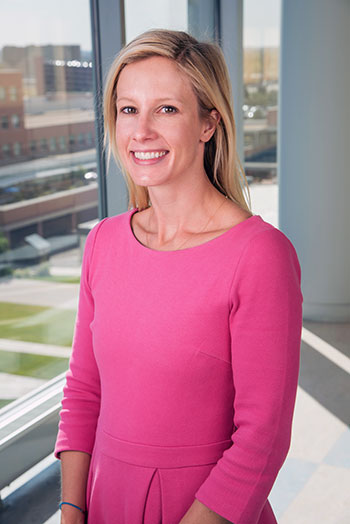You Can’t Have it All: On Being a Doctor Mom
Faculty Matters
By Emily Gottenborg, MD
 (April 2019) Vomiting daily for five months. Swollen legs and
sciatica limiting the ability to stand or walk. A few months of 24/7
care of a newborn:
hourly feeds, lack of sleep, emotional lability. And then, back to work
– pumping in a closet every 3 hours, rushing to leave work to relieve
the nanny, writing notes from home over dinner, all while fighting the
overwhelming fatigue from months of sleepless nights.
(April 2019) Vomiting daily for five months. Swollen legs and
sciatica limiting the ability to stand or walk. A few months of 24/7
care of a newborn:
hourly feeds, lack of sleep, emotional lability. And then, back to work
– pumping in a closet every 3 hours, rushing to leave work to relieve
the nanny, writing notes from home over dinner, all while fighting the
overwhelming fatigue from months of sleepless nights.
I am a physician mom, and have had two children while completing residency training and starting my career as an academic hospitalist. This experience – the joys and tribulations - motivated me to better understand what women physicians experience in their quest to be both excellent doctors and mothers.
A team of fellow physician-mothers and I chose to explore this issue in more detail. Our study, “You Can’t Have It All: The Experience of Academic Hospitalists During Pregnancy, Parental Leave, and Return to Work,” published in the Journal of Hospital Medicine in December 2018, intended to broadcast issues that women face as they become mothers while also pursuing an academic medical career. We also wanted to put forth solutions to support women in the field, and to help create systemic changes to bolster the physician mom workforce.
We interviewed ten women from top academic hospitalist programs across the country in this descriptive qualitative study. Our results highlighted five common challenges that physician mothers face:
• Lack of access to paid parental leave, causing many women to endure economic hardship or be forced to return to work prematurely.
• Difficulty in performing the daily work of a physician while enduring the physical challenges associated with the peri-partum period: the fatigue, discomfort, and sometimes medical complications.
• Breastfeeding challenges: as physicians, we promote adherence to medical guidelines, such as those published by the American Academy of Pediatricians, to breastfeed for twelve months. Oftentimes, women lack access to time, space, or storage to successfully pump at work, and are forced to quit breastfeeding prematurely.
• Becoming a mother can impact career opportunities: women described being passed over for opportunities, as colleagues perceived their plate was too full for additional projects.
• Responses from their colleagues in the health care profession included microaggressions directed towards their position as a mother. On a positive note, women describe the impact of motherhood on their ability to empathize with their patients, allowing them to connect, communicate, and relate to them in a new and meaningful way. Some women also commented on the incredible value of a supportive environment.
There are solutions to relieve the challenges imposed on new physician mothers, and it is imperative that the health care field embrace these changes. As a starting point, access to paid parental leave is critical. We must create support systems, and access to coaches and mentors to help support and encourage women during this demanding transition to ensure their success. Finally, in the academic environment, addressing the critical and time-sensitive promotion clock, and instituting more flexible promotion schedules will help promote women’s success in professorship and leadership roles.
Becoming a mother was the best thing I ever did. So was becoming a doctor. I’m hoping to help other women continue to do both successfully.
Emily Gottenborg, MD is an assistant professor of medicine in the Division of Hospital Medicine, and co-author of the study, “You can’t have it all: the experience of academic hospitalists during pregnancy, parental leave, and the return to work.”